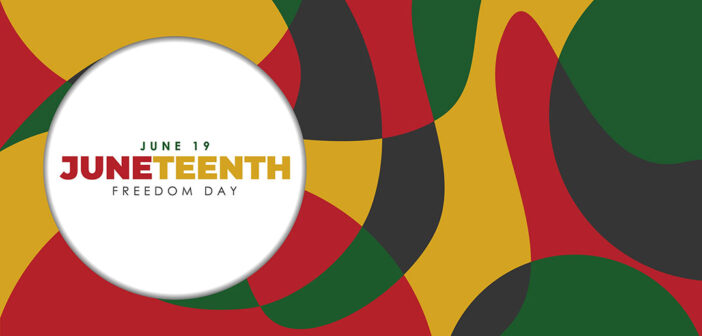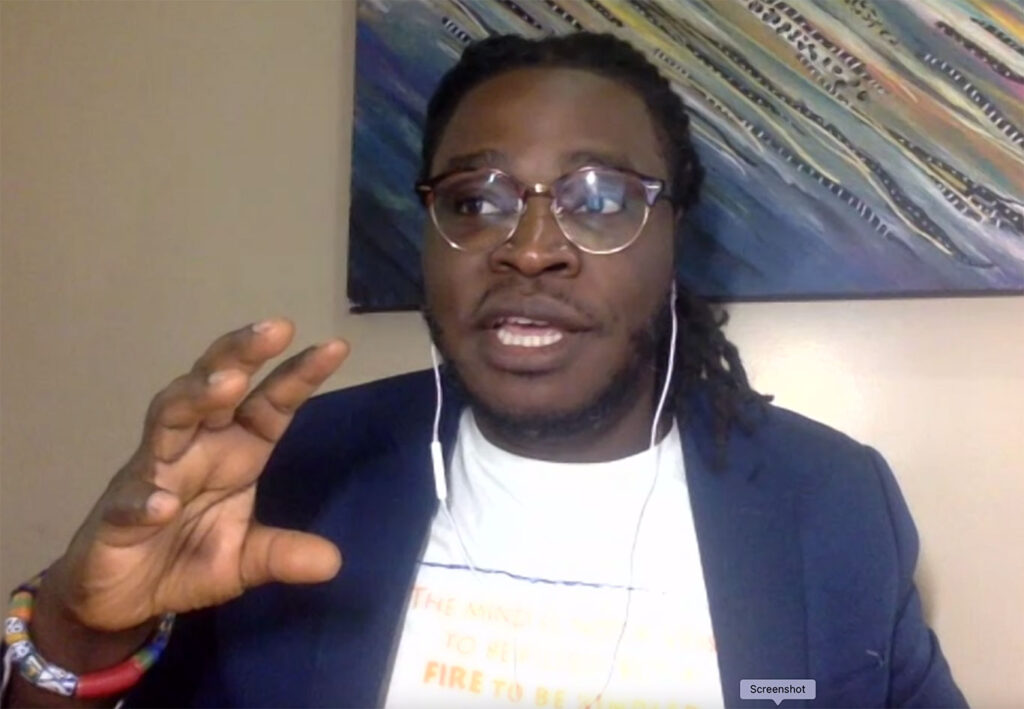Juneteenth celebrates the day in 1865 when news of the Emancipation Proclamation was delivered to enslaved people in Galveston, Texas—more than two years after President Lincoln issued the order freeing them. It came about 60 years after the Haitian war of independence. But both cases involve the intentional suppression of news of newly granted freedom, said a Fordham professor.
In an online conversation on June 16, Westenley (Wes) Alcenat, Ph.D., an assistant professor of history, urban, American, and African American studies at Fordham, and Rafael Zapata, Fordham’s chief diversity officer, discussed how the two events are tied to each other.
“You have this classic example of hundreds of thousands of people who were free in Texas but would remain unfree for another two years because the news was suppressed,” Alcenat said.
Just as the news of the Emancipation Proclamation took years to reach enslaved people in Texas, the news of the Haitian revolution—and the French Revolution—took years to reach Black men and women who might have been emboldened by such victories.
“If you go back to 1791, not only were words of the French Revolution being suppressed among the enslaved population in Saint-Domingue (as it was known back then) but news of the Haitian revolution, which lasted over a decade, was suppressed among the free Black and enslaved population here in the United States,” he said.
When the Haitian people finally won their independence from France in 1804, it also had unexpected consequences for the United States, he said. In a sense, it was both a gift and a curse for Black and indigenous people.
“It’s a gift in the sense that, nowhere else had this ever taken place before in human history—enslaved people rebelling and fomenting a revolution that established a state,” he said.
“At the same time, with the loss of Saint-Domingue as such a productive colony, France all of a sudden found itself without the funds to continue its many continental wars, so it turned over the Louisiana territory to the United States, which doubled the size. So, the domestic slave economy in the U.S. expanded very fast.”
Victory also brought serious hardships to the new Haitian nation, as the French would demand punitive reparations for its “loss of assets.” A recent New York Times investigative series, The Ransom, showed how two centuries of debt and dependency would follow.
While Haiti is still to this day struggling to thrive as a nation, Alcenat, a Haitian native, said that the principles guiding its founding can be found in the spirit of today’s Black Lives Matter movement.
When the country was formed, “Haitian constitutionalism,” as he dubbed it, granted citizenship to anyone who was indigenous or of African descent. Most of the indigenous inhabitants had been massacred by Christopher Columbus, but the move symbolically restored dignity to those who claimed the land first. Even the name of the new country, Haiti, which means “island of mountains,” was the name the indigenous inhabitants had chosen for the island.
“It’s not reparations in the conventional wisdom, but as a returning of dignity to that to whom it belonged and humanizing the indigenous folks whose land this was in the first place, and in the process, claiming for themselves a new form of indigenity,” he said.
What really connects the Haitian constitutionalism to Black Lives Matter was the principle that said that for someone to become a Haitian, they first had to declare themselves Black. Under the new post-revolution laws, white males were explicitly banned from owning land and property.
“This is the precedent to the Black Lives Matter, because what it’s saying is, the degraded, the dehumanized, the oppressed, those who are at the very bottom of society, we are going to reverse the order. They really do know what freedom is because they also know what non-freedom looks like,” he said.
“There are historians who very much want to argue that this was reverse racism, and excuse my French, but that is pure B.S. It had little to do with whiteness because in fact, white men could become Haitian. All they would have to do is say, ‘I declare myself Black,’” Alcenat said.
It wasn’t an abstract concept either, as he noted that during the war, 400 to 500 Polish soldiers who had been sent by Napoleon to reclaim the island and reimpose slavery defected from the French army and stayed on the island permanently. Their descendants can be found there to this day.
“In order to incorporate them into this new revolutionary society, the Haitians had to find a way to assert the principle of Black freedom, but not have that principle restricted by race,” he said.
“So Black freedom is, in a sense, the most capacious, most expansive form of freedom that was allowed.”
Zapata noted that although this was the third time the University had honored Juneteenth, this was the first event that connected it to research on Black liberation.
“The Haitian revolution was always an important piece to the notions of freedom,” he said.
“I can think of no better way to honor Juneteenth than to honor our outstanding faculty whose research is so close to this work”
The conversation was sponsored by the Office of the Chief Diversity Officer, the Office of Multicultural Affairs, and the Office of the Provost.




